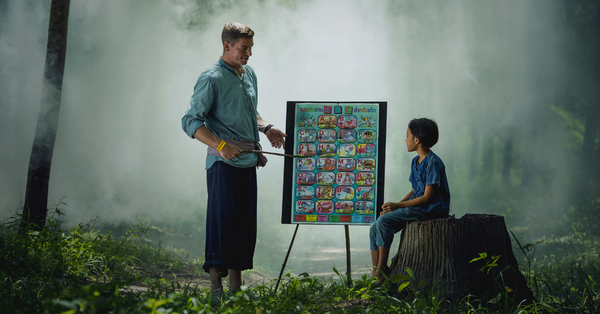Once upon a time, a woman ignited an entire movement with the line: “I won’t move.”
Her name was Rosa Parks and she openly confronted the horrible cultural norms of discrimination in society.
She was one of the remarkable game-changers who disrupted the course of history and made us, human beings, better.
Rosa Parks will be remembered as “The mother of the freedom movement” and “The first lady of civil rights” in the United States of America.
Her inspiring story got me thinking:
How can we use confrontation to grow and learn?
TL;DR:
We’re exploring conflicts in this one:
- Why do you need to deal with them?
- How to deal with them.
- How to learn from them.
Are conflicts actually a blessing in disguise?
Before we dive deep into the topic, let’s define conflict. God knows we don’t need military ones in our lives.
What is a conflict?
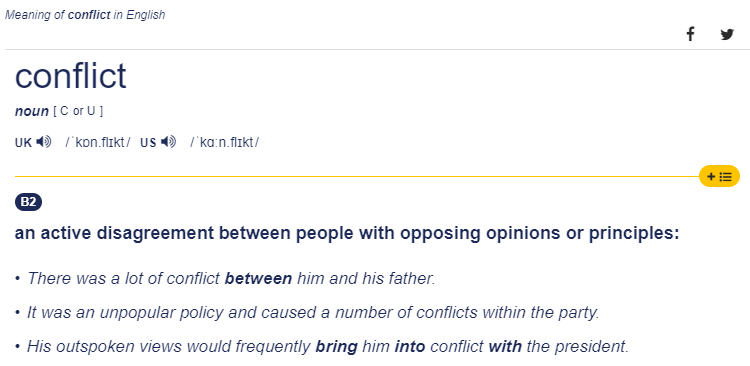
It happens between parents and children, couples, and co-workers.
Then you have the internet where random people clash on hot topics all the time.
Conflicts are everywhere around you and no one likes them.
They are usually scary and uncomfortable, full of negative emotions.
So, when faced with conflict you probably thought – can you just avoid conflicts instead of dealing with them?
Can you avoid conflicts?
No.
I don’t recommend avoidance as a strategy.
The only way to avoid conflicts is to dig a hole in the ground and hide in it. Where there are people, there are conflicting opinions. You either join the discussion and risk conflict or you never talk to anyone. I know which one sounds better to me.
Also, soon you will find out why conflicts are not the enemy.
But first, we need to understand why are conflicts an inescapable part of our lives.
Why do conflicts happen?
People of different ages, upbringing, backgrounds, interests, professions, and cultures have different norms.
Norms are expectations on how we should decide, act and talk in certain situations.
What happens when we socialize and work with people from different communities?
It is inevitable that our expectations will clash.
We start piling annoyances on the other human being, and sooner or later, conflicts explode.
So, the only sure way to avoid conflicts is to surround yourself with the same people like you. You create a little bubble of comfort for yourself.
The bubble effect will stop your critical thinking from evolving, and you set yourself for stagnation.
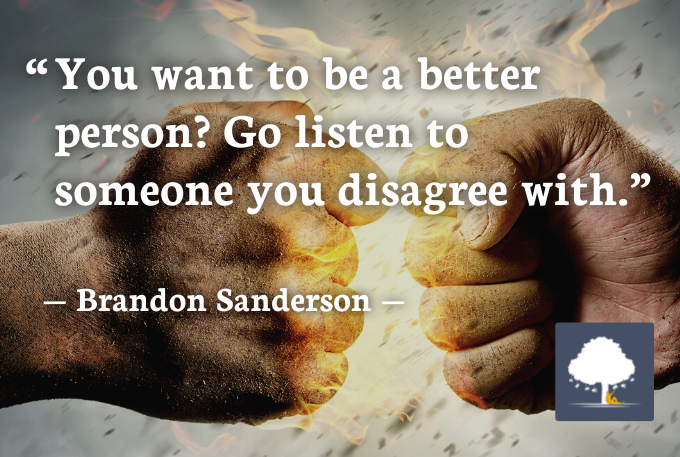
To learn, you need diversity in your circles.
But where does that put conflicts on the map?
Conflicts – good, bad, or ugly?
That does not mean it’s easy.
Accepting different opinions requires an open mindset that comes naturally to very few people.
Conflicts often occur on “my way” vs. “your way” to solve the problem at hand.
That kind of confrontation is handy when we have to attack old problems from a new angle.
Of course, we don’t need a conflict for every single problem. Sometimes we have to solve them quickly.
My conclusion?
Conflicts as neither good nor bad. They are necessary.
We need harmony to establish norms that help us solve challenges quickly.
We need conflicts to challenge those norms so we avoid stagnation.
Conflicts can be ugly, though.
This is a damn shame because people remember the ugliness, not the learnings from the situation.
So, how do you deal with and learn from conflicts?
How to deal and learn from conflicts (Diana’s 5 rules)
When it comes to conflicts, I’ve seen a few.
Anyone who spends enough time with smart people knows what happens when the team is stuck, the deadline clock is ticking, nothing is working, and nobody knows why.
You guessed it – everyone has the best solution to get rid of the pressure and nobody can convince the rest that this is as good as any approach to try.
The temperature rises and yet it gets icy cold and fresh conflicts are baking in the oven.
If you want to be better in these situations, check out my rules below.
Rule #1: Your opponent doesn’t want to kill you*
*Run for your life and call the police if they try.
When someone disagrees with you, your brain releases the same hormones as if they have physically attacked you.
“Just because I disagree with you doesn’t mean I hate you. We need to relearn that in our society.”
— Morgan Freeman
People don’t want to hurt you in most situations, especially at work.
It’s important to remember this when they oppose your ideas.
The question is, how to calm down when the tension is skyrocketing?
Instead of focusing on your opponent’s tone, posture and behavior, think about what kind of problem you’re trying to solve.
It will help you to have more options than the “freeze, fight, or flight” your brain tries to impose.
Once you get your monkey brain in line, you are ready for the next step.
Rule #2: Try to understand what your opponent wants from this discussion
Thread softly – you are two people bursting with hormones that scream “Physical threat!”
Treat the situation from your selfish perspective.
You need to confirm that you’re challenged intellectually, not physically.
The best outcome would be to reach a win-win solution and solve this problem, not to enter a competition on who was right.
But how can you understand what this annoying person wants, if not to hurt you?
Here is a proposal:
- People often escalate when they don’t feel heard and respected.
- Take a small break or sleep it over. Then restart the conversation in a friendly manner. After a small break, something like: “Hey, let’s try this again – I really value your opinion” might work. After sleeping it over: “Hey, about yesterday – you seemed a bit hot on the topic; I myself went too far. Can we start over? I really want to understand your point of view.”
- Ask questions, listen, and don’t challenge.
- Think where you both agree and start from there. Point it out.
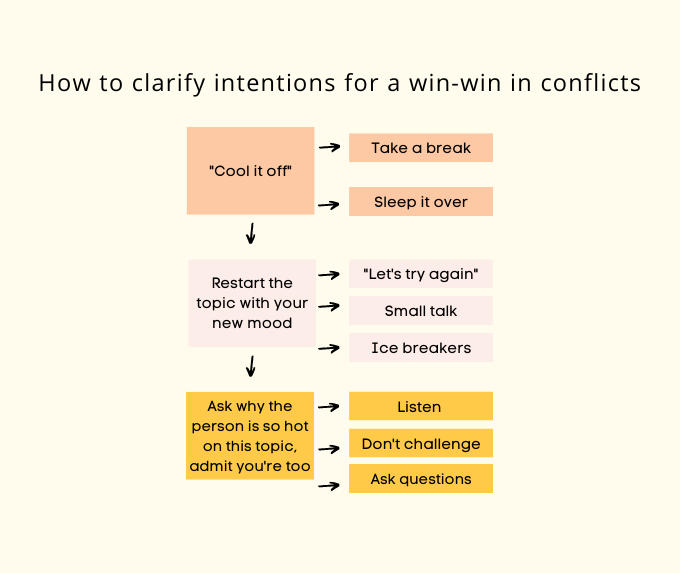
Clarifying your opponent’s intentions will help you to focus on what you really care about – a solution.
This is a more constructive focus than trying all possible ways to distance yourself from the opposing idea.
Rule #3: Ugly interactions require two
Of course, sometimes it gets ugly.
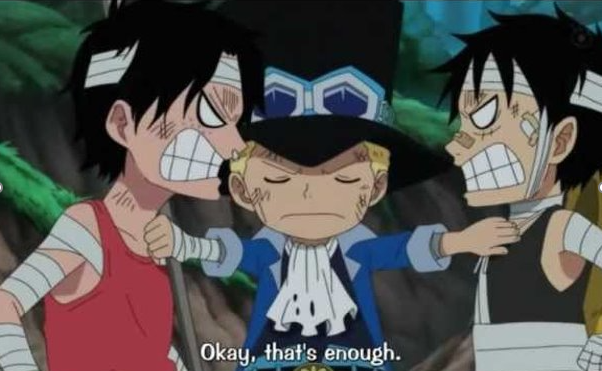
You need to understand that ugly interactions require two.
Think about it – have you ever been in a discussion where you thought:
“This is leading nowhere; why am I listening to this pile of crap?”
In this situation, you played the role of an enabler of a destructive discussion.
Or the opposite:
Someone begged you to stop for a moment and listen while you ignored them and marched forward with your rant to prove yourself?
In this situation, you played the role of a jerk and led a destructive discussion.
These things happen, and I recommend you don’t jump to conclusions.
It doesn’t mean you are a jerk by nature or like to be trampled by default.
Your behavior in conflicts defines neither your entire personality nor your opponents’.
So how to play a better role in arguments?
Rule #4: “What I did wrong was..”
To learn from a conflict, you need to start with yourself.
It’s the aftermath of a heated discussion. It’s so easy to blame it all on the other person and dwell on the unfairness in your conversation.
It feels right until the next time you need to face them.
Then you repeat the same ugly conversations about the new topics coming your way.
I offer an alternative.
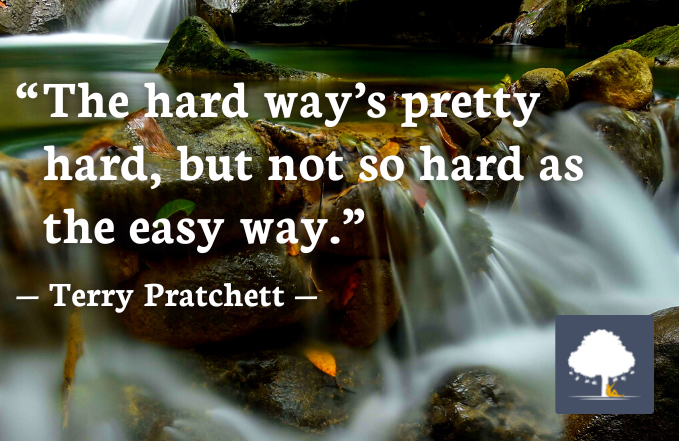
Forget about your ego and your “rights” to impose your opinion on the other person for a minute.
- Try to think about what you did wrong. Maybe you didn’t listen? Were you using strong language? Did you label your opponent as stupid or hostile without the need to?
It doesn’t matter if your opponent did those too. What matters is your mistakes because you can only control yourself. You can’t control others. - Share your mistakes and what you learned with your opponent. Don’t expect them to respond the same way or understand right away.
- Give it time.
This approach will not immediately help you feel better, but it will help to let it go with a few things you learned about yourself.
After all, you did everything you could. The rest is up to factors outside your control.
Rule #5 The problem will never be offended. People might
I’ve seen enough interactions that go south like this:
Person A: “This is a stupid solution!”
Person B: “Are you calling me stupid?!”
Then the discussion goes around who’s stupid and who’s not.
The problem and the rest of the team are kindly waiting for the two primates to sort out their emotions and return to the main topic.
If it sounds familiar, here’s what you can do about it.
If you disagree with an opinion, focus on the idea itself, not the person who gave it.
Share why you don’t like the opinion and what concerns you have if you follow it through.
Avoid labels. Even if you put a negative label on the idea, people will likely assume you put the same label on them.
If someone disagrees with your opinion, listen carefully.
If they drop a negative label on your idea, don’t feel obliged to be offended right away.
Don’t assume the negative thoughts about your ideas have something to do with you as a person.
Give it a try.
In conclusion
Everyone needs a challenge to grow.
Conflicts are the natural choice to challenge our ways and look at old problems from a new angle. Also, your skill and ability to deal with conflicts will get better over time.
The more you practice – the more you learn about yourself and others.
Becoming a game-changer yourself is a journey. Mastering conflict is one big part of that journey.
Keep learning,
Diana









